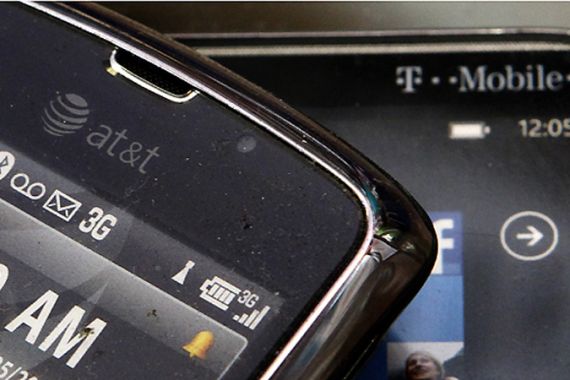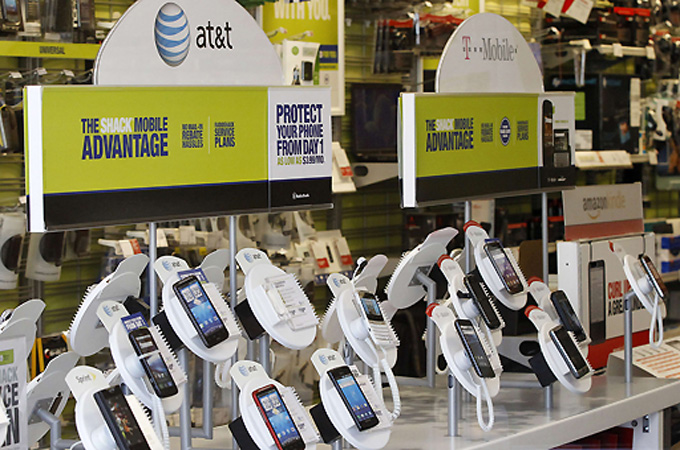US tries to block AT&T merger with T-Mobile
Justice department sues to prevent AT&T acquiring T-Mobile, on the grounds that $39bn purchase will hurt competition.

 |
| AT&T and T-Mobile are considering a legal response to challenge federal regulators [Reuters] |
The US government has sued to block telecoms giant AT&T’s $39bn purchase of T-Mobile USA, citing concerns it will harm competition in the wireless market and lead to higher prices.
The surprise move by the Department of Justice (DoJ) on Wednesday was the biggest antitrust challenge yet by the Obama administration.
If successful, it would end AT&T’s move to unseat Verizon Wireless as the number one US mobile carrier.
DoJ officials warned that allowing AT&T, the country’s second largest wireless carrier, to buy up the number four carrier would be disastrous for consumers.
“Were the merger to proceed, there would only be three providers with 90 per cent of the market, and competition among the remaining competitors on all dimensions, including price, quality and innovation, would be diminished,” James Cole, the deputy attorney general, said.
The lawsuit came just five months after the deal was announced and, despite the timing, one source close to the case told the Reuters news agency it was a real attempt to halt a “fundamentally flawed” deal, not a tactic to wring big concessions from AT&T.
Justice department officials said they were willing to consider proposals to alleviate their concerns, but they expected the fight to shift to federal court.
The court case could take months and cost millions of dollars.
They [the mobile carriers] would have to give up “so much” to win approval, the source, who wished to remain anonymous, said.
Legal response weighed
AT&T quickly indicated that it would not abandon the transaction, and together with T-Mobile is considering a legal response to challenge federal regulators.
In a statement, T-Mobile’s owner, the German company Deutsche Telekom, said it is disappointed by the DoJ’s action and “will join AT&T in defending the contemplated merger”.
AT&T has several incentives to take up a legal fight with regulators.
In court, the burden is on the DoJ – not AT&T – to show that the combination would harm competition.
 |
| Suit filed says AT&T and T-Mobile compete nationwide in 97 of the largest 100 cellular marketing areas [Reuters] |
If the deal does not go through, the company will be forced to pay T-Mobile a $3bn break-up fee and give it some wireless spectrum rights.
AT&T said it will ask for an expedited court hearing “so the enormous benefits of this merger can be fully reviewed”.
Morgan Reed, executive director of the trade group, Association for Competitive Technology, said AT&T has at least one key fact on its side: Deutsche Telekom has said it does not plan to continue to invest in upgrading
the T-Mobile network to deliver faster wireless.
That means, “T-Mobile is not a competitor anymore”, Reed said.
“T-Mobile has already stepped away from the table. We’re at three nationwide wireless carriers no matter what.”
The association, which represents more than 3,000 small and independent application developers, believes the merger would benefit the wireless broadband industry.
However, the lawsuit used some of T-Mobile’s own documents describing its role in the market to explain why the merger should not take place.
In those documents, the company calls itself “the No. 1 challenger of the established big guys in the market and as well positioned in a consolidated 4-player national market.”
AT&T and T-Mobile compete nationwide, in 97 of the largest 100 cellular marketing areas, according to the suit filed in US District Court in Washington. They also vie for business and government customers.
What lawsuit says
The lawsuit says the acquisition would eliminate a company that has boosted competition with low pricing and innovation.
Democrat Herb Kohl, who heads the Senate Judiciary subcommittee on antitrust, competition policy and consumer rights, said the suit was an effort to protect consumers “in a powerful and growing industry that reaches virtually every American”.
AT&T and T-Mobile have said the merger would reduce dropped and blocked calls, and speed mobile Internet connections for subscribers. Faster service would result by combining their limited wireless spectrum holdings at a time when both companies are running out of airwaves to handle mobile apps, online video and other bandwidth-hungry services.
Finding more airwaves to keep up with the explosive growth of wireless broadband services is a priority of the Federal Complaints Commission and the Obama administration.
But the DoJ said AT&T could “obtain substantially the same network enhancements … if it simply invested in its own network without eliminating a close competitor”.